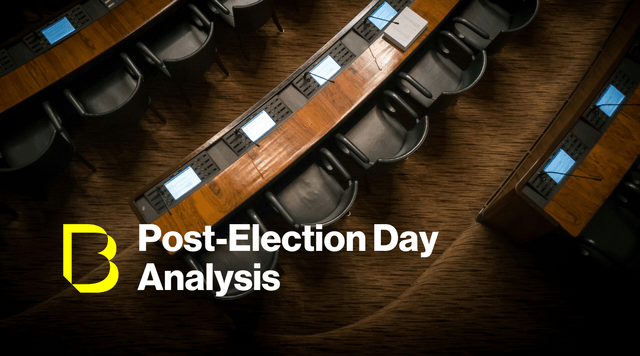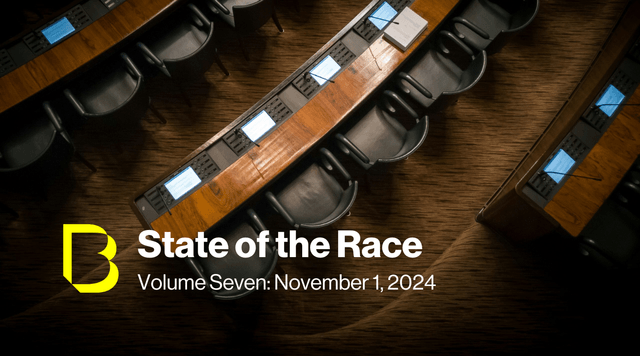NEW YORK, October 29, 2024, – Heightened political tensions among the American electorate have spread into the workplace, creating concern for more than 70% of leaders and employees who anticipate a contested presidential election, according to new research from Burson. Only 36% of executives surveyed, however, say they have conducted scenario planning against the risk of a protracted presidential election and how it could impact their workforce. And, while 76% of leaders say they feel prepared to manage such concerns, by contrast 53% of employees say they believe their employers are prepared, creating a significant perception gap.
The survey of 1,500 U.S. workers and 500 U.S. executives highlights the degree to which each group is worried about the effect of the 2024 election on the workplace. Both leaders and employees surveyed expressed concern about the possibility of a contested presidential election (70% and 76%, respectively) and potential post-election violence (56% and 64%). More than 4-in-5 employers (82%) and two-thirds of employees (67%) say they have concerns about various ways the election could disrupt their workplace.
Burson undertook its research after conversations with business leaders across industries identified a need to better understand how the dynamics of this U.S. presidential election could impact the nation’s workforce. While Americans as an electorate are largely prepared to accept election results according to research by Ipsos, the potential for an extended period of uncertainty and escalated tension in a close and legally contested election has been widely reported.
“Our clients are evaluating the related risks of a disputed electoral outcome and the best way to maintain a productive and inclusive environment for employees, many of whom are apprehensive as they weigh the precedent for violence and the pressure of ongoing polarization,” said Burson Chairman AnnaMaria DeSalva. “Our research findings present practical considerations for the C-Suite and an opportunity for leaders to ensure they establish the tone and employ the methods that can help ease conflict and distraction in the workplace.”
High Interest, High Concern
- The presidential election is top of mind for the vast majority of employers (90%) and employees (81%).
- 46% of employers and 31% of employees say the election is already a source of tension or friction in the workplace.
- In addition to the high percentage of employers (70%) and employees (76%) who say they anticipate a contested election, more than half of each group say they worry about potential violence following the election.
The Preparedness Perception Gap
On average, executives are more confident in their preparedness to handle election-related situations. This is in contrast to employee perceptions of readiness, especially regarding safety and stress, according to the survey results.
- While 76% of employers – and 84% of C-suite executives – say they feel prepared to manage election-related issues, by contrast 53% of employees say they believe their employers are prepared.
- 55% of employees versus 79% of employers say they believe their company is prepared regarding safety and security concerns related to the election, and 56% of employees versus 77% of employers say their company is prepared to address potential discrimination or harassment related to political beliefs.
- Similarly, 70% of employers responded that they're prepared to provide resources and support for employees experiencing election-related stress or anxiety, but only 46% of employees say they perceive the same.
- 71% of employees say they want clear guidelines regarding political discourse at work, but only 29% say they are aware of such policies.
Today’s Politically Charged Atmosphere Can Affect Employee Experience
The survey findings support earlier research conducted by SHRM showing that 80% of U.S. workers reported people treated others poorly due to political opinions. According to Burson’s research:
- 44% of employers responded that they are already concerned about how tensions are currently impacting the workplace.
- 28% of employers and 38% of C-suite leaders say they are aware of instances where employees in their organization have experienced mistreatment in their workplace related to political views or the upcoming election.
- 17% of employees say they have personally experienced this mistreatment. Black/African American employees surveyed report the highest incidence at 27%.
“Our research demonstrates that dysfunction in the external political environment can lead to a more difficult workplace experience for employees, which has been shown to directly compromise performance,” said DeSalva. “Given these findings, there is a clear and present need for business leaders to ensure that current workplace dynamics are well understood and to fully evaluate readiness for a potentially escalated environment following this year’s presidential election.”
Burson recommends that leadership teams bring focus to the ‘tone from the top’ and readiness with executive communication; improve competency among middle managers and front-line, customer-facing employees to recognize and handle issues; promote civic education around the electoral process; modernize intelligence and monitoring of the external environment; and optimize rapid response systems and employee engagement strategies.
“There are substantial methods available for leaders to engage employees and improve working environments, but they are often inconsistently or under-utilized,” DeSalva continued. “While each company’s needs are unique, a robust employee strategy will build value and resilience well beyond the election, especially given the ongoing problem of polarization and the complexities of today’s operating environment.”
About the Research
Burson’s survey on the current private sector workplace environment ahead of the U.S. presidential election was conducted from September 17-24, 2024. Data was collected from 1,500 U.S. employees and 500 U.S. employers – managers and executives, including C-suite leaders. There is a margin of error of ±3% for employees and ±4% for employers.

You might also like
Explore all
Amid disruption, C-suite leaders have the power to steady their workforces

Key learnings from a busy first week of the new U.S. presidential administration

Post-Election Day Analysis

